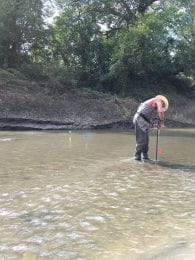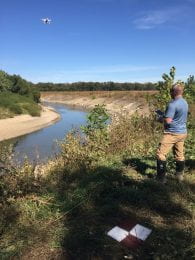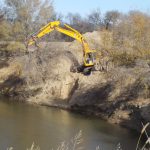Streambank erosion in Kansas is a serious concern, particularly upstream of reservoirs. In just one year, normal changes in rainfall or storm events lead to tons of soil from streambanks washing away into the water, headed downstream. That same sediment, when unchecked, also can diminish reservoir capacity, degrade wetland areas, and create problems with municipal water systems.
With approval from the Corps of Engineers and funding from both the Kansas Department of Health and Environment (KDHE) and Watershed Restoration and Protections Strategies (WRAPS), watershed specialist Ron Graber and his team partnered with a select few landowners along the Smoky Hill River interested in trying an untried method of streambank stabilization. This experiment is called a “woody revetment,” and, if successful, could save landowners tens of thousands of dollars – more, if there are several unstable streambanks on a property.
Continue reading “Planting new foundations: Streambank stabilization on the Smoky Hill River” →


